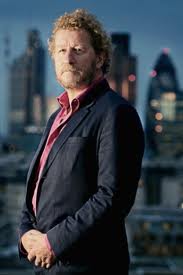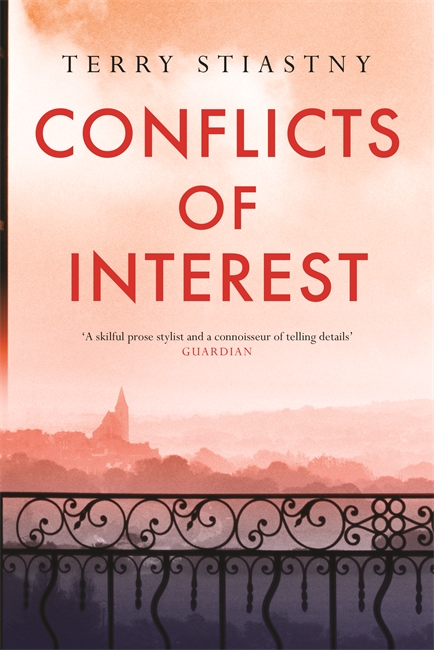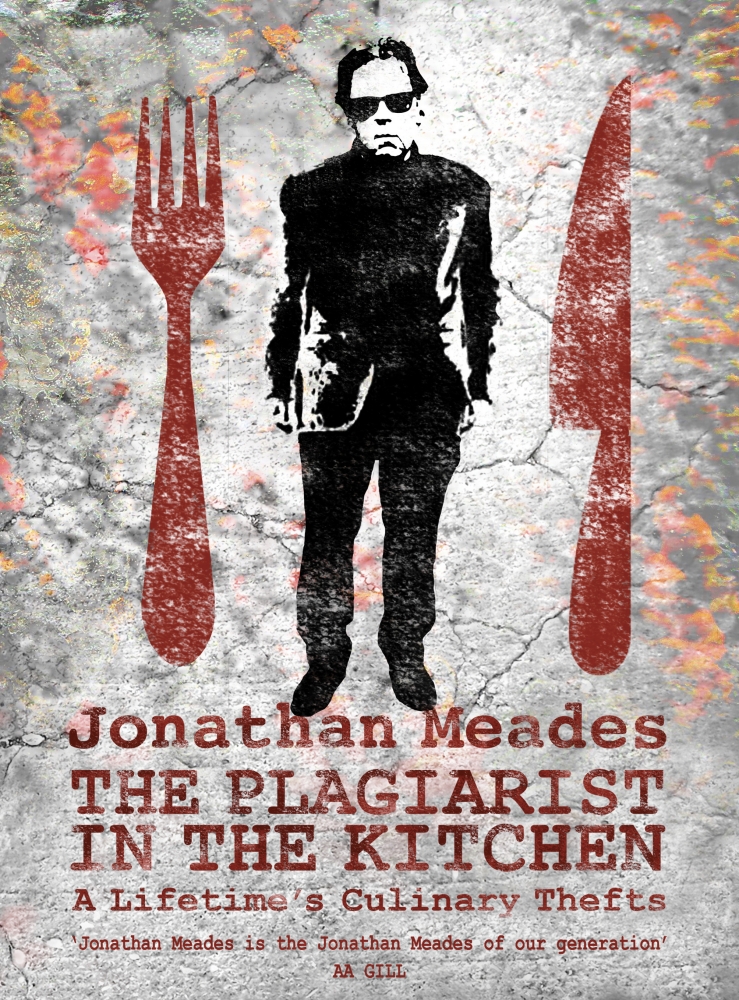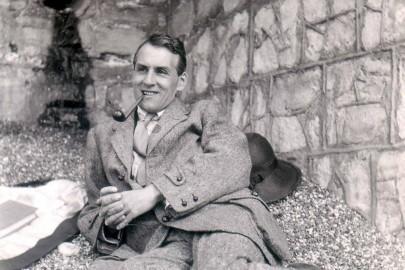Faulks on Fiction (Saturday, 9pm on BBC2 and you can catch up on the iPlayer) kicked off with a look at The Hero. Faulks introduced the programme by telling us he was going to focus on characters rather than the biographical details of authors, which apparently we’ve been paying far too much attention to in recent decades (though not in the academy, where the Death of the Author was proclaimed by literary theoreticians a while ago now – but, yes, best ignore that lot).
What followed had a lot in common with those entertaining Channel Four 100 Greatest… programmes where a succession of talking heads provide us with their reasons why such-and-such a thing was ‘brilliant’, illustrated by clips, this time from some of our favourite BBC costume dramas. In this instance, though, our top ten (or so), was chosen by Sebastian Faulks, novelist, rather than by us, the viewers.
Perhaps a disparaging comparison for a ‘major’ series in a season about literature; but it really was entertaining, if not very revelatory to anyone who’s read the books. I did have a quibble, however – quite a large one. OK, it’s TV, Faulks was covering around three hundred years in an hour, and simplifying things is sometimes necessary to make them accessible. But his overarching thesis was painted in such a broad brush that it obscured as much as it highlighted.
He followed the ‘never glad, confident morning again’ line: that the First World War marked the beginning of the end of the hero, someone able to impose himself or herself on the world around them. Before the War, characters from Robinson Crusoe to Sherlock Holmes were rugged individualists who shaped their environments and whose qualities eventually resulted in their triumph, or at least vindication; after the War, we could no longer believe in humanity’s virtues and the individual’s ability to overcome: as a result, the hero declined into victim (Winston Smith) before disintegrating altogether into a collection of modish appetites (John Self). At which point Faulks pronounced The Hero ‘dead’.
Of course, the First World War (and the Second, as well as the other horrors of the twentieth century) resulted in a sort of cultural disillusionment. But Faulks overstates his case to such an extent that it makes important parts of the history of the English novel incomprehensible.
To accept it we’d have to ignore the creations of some of the most interesting, indeed greatest, pre-WWI novelists. How many of Hardy’s heroes triumph? Does Jude the Obscure impose himself on his world, shaping it to his will? How about Tess? And who’s the conquering hero in Conrad’s Secret Agent? Or his Heart of Darkness?
Sherlock Holmes, we’re told, was our ‘first superhero’. But wouldn’t he also have to be one of the last, the disillusionment of World War I supposedly meaning we could never believe in such transcendent figures again? And then there are the non-supernatural but still considerable George Smileys, Harry Palmers and James Bonds: not unalloyed goodies but pretty accomplished post-WWI heroes of their stories nonetheless. Who would you back to get the mystery cleared up, Holmes or Bond? Not much in it, is there?
What’s more, the death of the hero in the early 1980s must have come as news to Robert Harris, who gave us his thoughts on Winston Smith (and to English novelists as diverse as Alan Hollinghurst, William Boyd and Henry Porter).
I could go on. But it might instead be useful to wonder what might have worked better. What struck me, seeing the parade of heroes and heroines dance across the screen, was how characters in the English novel seem to play off each other. Certainly, they inhabit different worlds, but not so much that they aren’t recognisable, one to another: John Self as an eighteenth-century rake let loose on modern-day New York; Becky Sharp manoeuvering her way through a succession of chick-lit novels; Tom Jones’s jostling against the proprieties echoed by the rather more repressed frictions produced by Jim Dixon. Intertextuality is one (ugly) name for it.
We may be living in a more disillusioned and cynical age (or have we merely lost some illusions to gain others whose illusory nature we haven’t yet managed to discern?). But fiction’s dance goes on, a circular one where the all-too-human foibles of the performers continue to look remarkably familiar.












I saw this as well and thought it a very poorly executed and vapid bit of TV, because the huge scope meant that it could not effectively uncover any new insights for people who already knew the books, nor spend long enough really illuminating a subject in order to enthuse new recruits.
Yes, good to see books on the telly but it was pretty lightweight… much meatier fare was on offer with Henry Hitchings’ Birth of the British Novel on BBC Four (http://www.bbc.co.uk/programmes/b00ydj1p). (Btw, Watch this space – Henry’s engaged in writing a Dabble for us).
But it was fun to see the clips from the BBC adaptation of ‘Vanity Fair’ from the late 1990s. That was one of Andrew Davies’ best, funny and perfectly cast, and had a quite magnificent trad jazzy soundtrack.
Agreeing with all the above: I was taken by surprise when he came up with that interpretation of WW1 and its aftermath. One of those occasions when you ponder if the speaker isn’t expressing his own private opinion but one shaped to please the politics of his preferred audience.
He has written a decent novel on and around this, so presumably would have been aware that it took considerable time for what you might term the Blackadder thesis to take hold: most twenties WW1 fiction gets stuck into the Bosche with terrific gusto. Even during the War itself, relatively little poetry was of the Owen/Sassoon stamp, although arguably the best of it was: the bulk – and there was masses of it – thought dulce et decorum the most obvious common sense.
More recently, Niall Ferguson has discussed the phenomenon by which many men returning from the war “never discussed it.” Many, of course, would have wanted to put trauma and horror behind them – the Harry Patches of this world. (Anyone else think that Andrew Motion’s poetry programme with Patch the most embarrassingly condescending telly of its year? And anyone else admire Patch for his dignity in the face of such fatuity and arrogance?). Others, however, show every sign of having enjoyed the excitement – all those smuggled-in Box Brownies – and THAT was what they didn’t want to display afterwards. Bulldog Drummond had his originals too..
Either way, the War wasn’t fought by writers: writers were needles in the Kitchener haystack, and the vast majority of those present never got to express what they thought about it all in any way whatsoever. Faulks, lazily in my view, took the politically-correct-literary view, universalized it unfairly, and all for his thin thesis on heroes. I won’t be watching the others in the series.
Another piece of TV book (history thereof) this week was the BBC4 programme History of the Novel. A rotund chap in a leather coat and with waving arms had the con. Complete with Janet and John voice over and many, many walkies to camera it was, after a short while, terminated.
Oh, allegedly it was about the novel.
Yes that’s Henry Hitchings, Malty. Be nice, he’s dabbling.
Is he? I really enjoyed that programme! What’s more, it was, as a byproduct, what looked like an excellent guide to some very good London bars. I don’t suppose there’s any chance of your asking him which ones they were? on behalf of a London exile who is building up a to-do list for his next day release from Edinburgh?
He’s a busy man, I suspect, but I’ll try!
Henry reviewed our own Jonathon Green’s ‘Dictionary of Slang’ in the FT –
http://www.ft.com/cms/s/2/81c14682-0ee5-11e0-9ec3-00144feabdc0.html#axzz1DT3TruiA
And, incestuously, Jonathon has reviewed Henry in the same organ
http://www.ft.com/cms/s/2/974b7382-2fe3-11e0-a7c6-00144feabdc0.html#axzz1DT3TruiA
Oops, only kidding, honest.
I think (on the basis of not having watched the programme ie complete ignorance) that Worm chose the word ‘vapid’ wisely. Certainly, my glimpses of Faulks (Lit Quiz on Radio 4, his Desert Island Discs) have led me to an impression of him as the essence of vapid.
The essence of vapid indeed – and the whole series is built around novels that have been done on telly (and have easily accessible clips) and based on the absolute necessity of having Faulks and his winsome curls on screen for every single feckin link. Ugh. Mind you, I did enjoy the opening section of Birdsong – v sexy, v Flaubertian – pity about the rest of it.
I enjoyed Birdsong but it’s years since I read it. Atonement kind of nicked the structure, didn’t it?
I actually invited Faulks to do a post but his agent said he wasn’t doing PR for Faulks on Fiction… just as well after the slating he’s got here!
That WWI theme is bog standard Eng Lit undergrad talk, which I presume is where he picked it up and where his producers at the BBC also picked it up. A perfect example of circularity.
It’s a bollocks thesis, obviously, as Gaw points out, but especially when you leave the realm of the ‘literary’ novel and enter other areas of fiction. Dr Who, for example, can impose his will on the universe with a bit of patter, some scientific know how and a doohickey that lights up at the end. Asterix drinks a magic potion and kicks seven shades of sh*t out of the Romans.
Global audiences line up to watch Hollywood icons resolve problems neatly in a three act film. And so on.
What a pile-on! Has anyone got anything nice to say (that is, apart from noting his winsome curls)?
The photie gives him a sort of, you know, raffish charm, kind of Brian Blessed meets the Ford Ka.
I didn’t watch it, obviously, but did he even distinguish between the epic hero and the tragic hero? For several thousand years the tragic hero has failed to impose his will on much of anything.
He followed the ‘never glad, confident morning again’ line: that the First World War marked the beginning of the end of the hero, someone able to impose himself or herself on the world around them
It astounds me anyone could argue that when Superman wasn’t even born until 1932.
It would be fun to see the Dabblerites try your hands at coming up with more of these kinds of popular shibboleths about modern times that won’t go away no matter how throughly and expertly they are debunked.
Malty: Weirdly, that comparison makes sense.
Daniel: It didn’t delve that deeply (or at all, in fact).
Peter: That sounds a great idea. After you, sir!
I saw it too – very disappointing. When it suddenly leapt to the First World War I couldn’t understand it – then of course, I remembered ‘Birdsong’.The hero he should have mentioned if he was going to give his own stuff a puff is the hideous ‘Enderby’.
He only gave a passing glance to Dickens, no George Eliot or Austen. How can you present a programme about the novel without mentioning the Victorians???
He finished by saying that these days heroes are to be found in the crime genre – but he used Sherlock Holmes from way back, which was a peculiar choice anyway. Too bitty. Too much left out.
Jim Dixon should of course have featured but how boring to go yet from Amis pere to fils (an old chum, of course).
Quite right Jane. By the way, I thought Martin Amis’s irrelevant comment that “I don’t want to write in a lower register than what I can write in” was one to treasure.
Thanks Gaw – by the way, although I found myself at one point reading about the whole dang family, including EJH (had an ex-boyfriend who used to take K to the pub in his minicab) I prefer K, and have a copy of The King’s English. I turned down the segment mostly on Martin because a) London Fields is quite simply the most repellent novel I have ever read and b) I thought the way Martin used the death of his poor cousin who suffered at the hands of Fred West in his fiction and interviews quite solipsistically self-indulgently offensive. A far bigger misogynist than his father ever was.
But I digress. Faulksie – eschew the goggle box and try and write at least one really good novel before your pink shirt and curly golden hair have faded into nothingness.
In Foyles (St Pancras) they have (had?) a display of authors ‘of the century’. Centre row: Faulks, McEwan and between them Dan Brown. Seemed to sum it up rather well to me. But then I’m only a sordid, down-market slang collector.
agggh mcewan – his early stuff was good, but Saturday was rubbish.
I thought yesterday’s episode on The Lover was a distinct improvement: there wasn’t a big idea obscuring things. As well as some enjoyable précis and commentary, there were more great clips, making me want to see some of those adaptations again (The Line of Beauty) or for the first time (Tess).
Naturally, some of it was debatable – for instance, Mr Darcy as clinical depressive (perhaps he was dyspeptic too and just need Elizabeth to dispense some Rennies?) – but that’s as it should be.